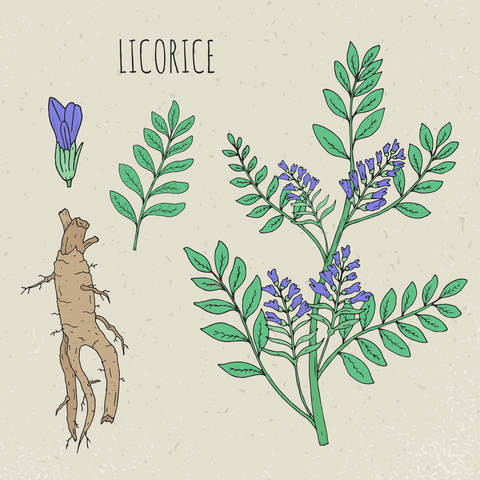Licorice Root

Also known as Glycyrrhiza glabra (and several other species, some dangerous) True Licorice, and Sweet Licorice.
Introduction Licorice root is one of the most widely used medicinal herbs worldwide and is the single most used herb in Chinese medicine today. In a recent survey of Western medical herbalists, licorice ranked as the 10th most important herb used in clinical practice. An astonishing number Chinese herbal formulas "over 5,000 in fact" use licorice to sweeten teas and to "harmonize" contrasting herbs. Its first documented use dates back the time of the great Chinese herbal master Zhang Zhong Zhing, about 190 AD.
Constituents Glycyrrhizin, complex immune-stimulant sugars.
Parts Used The root in dried form.
Typical Preparations Teas, tinctures, and in encapsulations. The whole sticks and slices may be chewed straight and are pleasant tasting.
Summary The most common use of licorice world-wide is to treat coughs and colds. Licorice is especially useful for treating coughs with sticky phlegm or for treating colds that accompany stomach upset. Chinese medicine also uses licorice to treat various forms of chronic fatigue. Gastric and duodenal ulcers and canker sores can be treated with the herb or with its common derivative, deglycyrrhizinated licorice (DGL). If you use DGL, however, you must remember to chew the capsules or they will not work. Saliva activates DGL.
Precautions Don't use licorice if you have high blood pressure, and don't use licorice if you eat a meat and potatoes diet. Your body needs potassium from fruit and vegetables to compensate for the excretion of potassium stimulated by licorice. If you use steroids or an asthma inhaler, licorice will increase both the effectiveness of the drug and the severity of its side effects. Its long term use is not recommended, and it is not recommended for use by pregnant women. May cause stomach upset if taken in large quantities.
PURCHASE LICORICE ROOT EXTRACT
For educational purposes only. This information has not been evaluated by the Food and Drug Administration. This information is not intended to diagnose, treat, cure, or prevent any disease.
This information courtesy of MOUNTAIN ROSE HERBS, with full, written permission for reuse. For further traditional information concerning Licorice, please visit this excellent resource from Botanical.com. Used with full, written permission.






